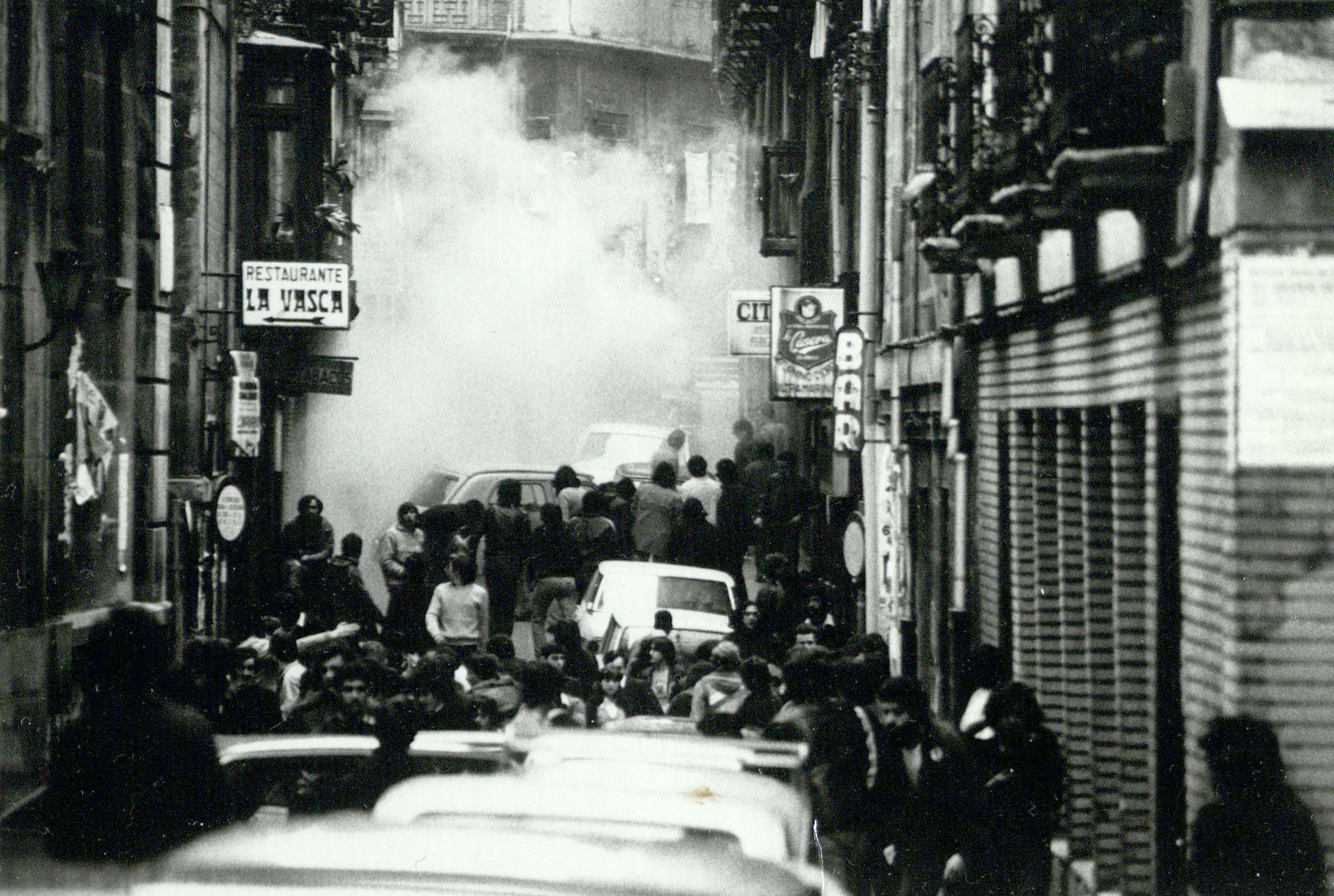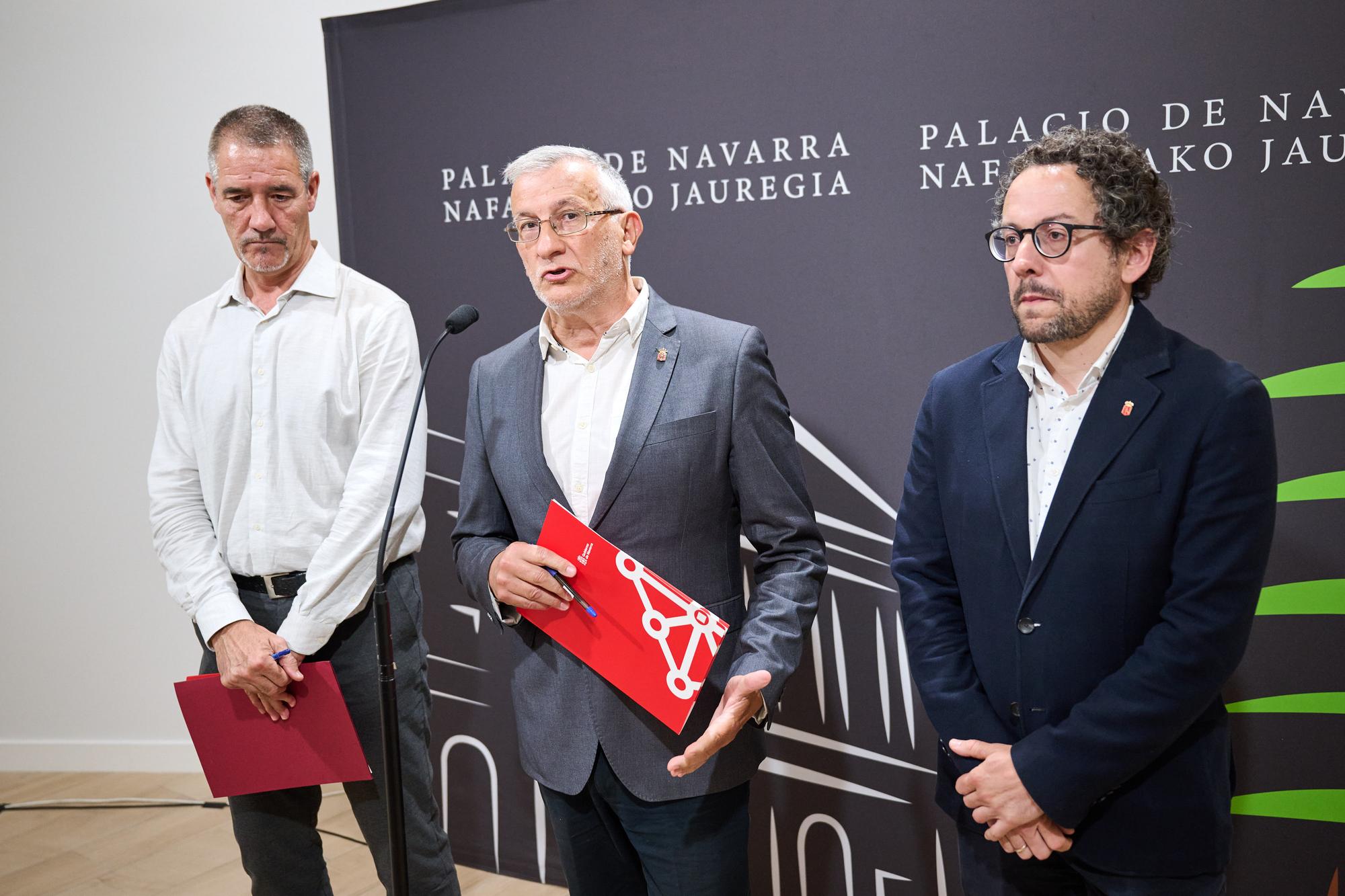"This book explains why Navarra is so conservative and rebellious at the same time"
- Historian Imanol Satrustegi (1993, Pamplona) brings us to Navarra from the years 1960-70 Another world he has just published. He has analysed the evolution of the revolutionary movements of the left (ORT, LKI, EMK, PT…) and the reason for the centrality in Navarra that did not take place elsewhere.

We met in the Old Town of San Sebastian with the collaboration of historian Josu Txueka before the presentation of the book. For three years he has developed his doctoral thesis at the Public University of Navarra on the revolutionary movement of the Navarre Left. To immerse oneself in the causes of the reddish effervescence that occurred in the years 1960-70, there have been many militants interviewed, the visited sites and the journals they have researched. We talked to him about the history of those Navarros who at the time took the red flag than the red hat.
The book is based on his research thesis. The work is seen with the will to claim that there was also a red Navarre.

In the past, very long theses were made and it took many years to complete a thesis. I was clear that I wanted to make a short thesis and I've done a work of between 200 and 300 pages. The book is a raw thesis. I say many times that this book explains some of what we are. Why Navarre is so conservative and so red or rebellious at the same time, so vasquist and Castilian speaking. The work explores why.
In Gipuzkoa and Bizkaia there is a conservative image of Navarre. UPN, Opus Dei... Yeah, but behind that there's a lot more. I believe that without understanding the events that took place in the Transition, it is not possible to explain why the Navarros refused to NATO or Navarre was the territory that had the highest level of submissive status in the Spanish State. There was a rebel social base and its study is essential.
He has questioned some existing topics.
It may refer to the transition period. But I think that to dismantle that conservative image of Navarre we have to go further. When we represent Navarra in the Civil War, the groups of requetés that formed in the Plaza del Castillo de Pamplona always come to mind. It was an event of great symbolism, but it may be more symbolic to know that 3,500 were killed (republicans, nationalists, communists…). Because the Carlists conquered Navarra after the murder of the existing left Navarre. So is Navarre historically conservative? Yes, but not as much as we think.
But you, in particular, have focused on the study of the revolutionary movements of the left of the 1960-70's, is it not paradoxical that, like ETA, these movements have also germinated in Christian spaces?
This was key. We could say it was an international phenomenon. Some ecclesiastical sectors approached the working class, initially the intention was to bring the word of god to the workers, but when confronting reality there were people who dedicated themselves to these Catholic movements and from there would emerge transformative, political commitments, etc.
During Franco there were no spaces for ordination, everything was forbidden. The church had some privileges and those privileges were loopholes to create from it a new anti-francoist opposition. Examples of this are the priests who got involved politically alongside many sectors, Periko Solabarria in Bizkaia or Nafarroa Lino Otano, Patxi Erdozain, Jesús Lezaun, Patxi Larrainzar and others.

You're a chantrea, so the Eunate Institute was the convent of Canosian. Faith became a space for transformation of the neighborhood and the world.
The resident movement was another branch of the labor movement. Neighborhoods were poorly built speculatively, stacked. Without asphalting the streets, lighting, sewerage… Everything was missing. In working-class neighborhoods the needs were high. But the workers, as they made their lives in these neighborhoods, struggled in the neighborhood as in the workshops, and to carry out all these processes had a lot to say about the parish and the Christian spaces of the neighborhoods. This would further unite the Church and transformation.
"In Navarra vasquism was almost transversal in all anti-Francoist and progressive sectors"
This situation would be radicalized by the global aggression of 1968.
In the middle of the Cold War, capitalism and socialism were in conflict to see who prevailed. Although the image of the USSR began to wobble, there were Cuba, Algeria, Vietnam and, above all, China. It was still possible to represent different worlds. In this context, there was May 1968, when the largest general strike in French history took 10 million workers to the streets. It seemed that revolution was possible in the French and Spanish States, or in the Basque Country.
At the international level there was then a revolutionary wave, also here, and that is what I have studied. If you prefer the local or Navarra variant of that wave.
So were the revolutionary movements of the left in Navarra. Unlike other territories, it is also ahead of ETA or PCE.
That is the peculiarity of the anti-francoist opposition in Navarra. In most of the territories of the Spanish state the anti-francoist opposition [Santiago] was led mainly by the PCE of Carrillo, through CCOO. The labour movement was the backbone of the Franco opposition in Hego Euskal Herria and Navarra, especially the communist party, had a weak force in front of the movements on its left (ORT, EMK, LKI, PT...). The latter assumed the leadership of the labor movement. In Gipuzkoa the situation was similar. Perhaps in Bizkaia it was more equal, because because of that important tradition that the PCE maintained since the time of war, and although it was suspended, there were some of its currents. Due to its peculiarities, in Álava the environment was more similar to that of Navarra.
.jpg)
In the case of ETA, at that time he had difficulties to enter the labor movement in Navarre and therefore influence mass mobilizations. One of the main causes was repression, which when focused on ETA was impossible to influence the workplaces or neighborhoods. The other aspect would be time, because in one way ETA came late, because Christian and post-revolutionary movements began earlier. Finally, there would be a problem of partitions.
Did this centralizing essence of Franco directly influence these revolutionary movements?
Anti-Franco was not identified in part with the idea of Spain, which was intimately linked to the regime. Anti-Francoism, in general, was closer to peripheral nationalism. This directly affected the anti-francoist movement of the Basque Country, since the Basque and the anti-Frankinst discourse joined in specific moments. On the one hand, in order to do so, there was the nationalist influence of ETA and, on the other, the influence of the rebirth in Basque culture.
Was the Burmese judgment a turning point in the structuring of this anti-Francoist vasquity?
Probably the key moment is Burgos, but the rhythms were different. After the Burmese events, in Gipuzkoa and Bizkaia the nationalists and revolutionaries approached, began to share an imaginary. In Navarra this occurred later, especially in 1975-76. In interviews with many militants, it can be seen that sometimes this left revolution was halfway, because they placed the flags “the Basques” that existed in Tudela, but nevertheless, the same militants, when coming to San Sebastian, had to hear on several occasions that they were Spaniards.
Despite being halfway, unlike now, it was possible to create an Euskaltzale consensus from Tudela to Bera.
During the Franco regime, in the last year, until the time of transition, there was a consensus: in Navarra the Vasquism was transversal in almost all the anti-Francoist and progressive sectors. There were different degrees, some independentists, other federalists, other autonomists, but Navarra was part of the Basque Country. The motto “Navarre is the Basque Country” spread widely. The Basque symbols became general. An example of this is the attitude of the PSOE of the time. We will be called chaqueteros [Kamaleoi will call us], recently published by Mikel Bueno, explains how the PSOE defended the right to self-determination, to the Basque symbols, and defended the autonomy of the territories of the South to four. Perhaps the only exception was the PCE. The right was very afraid of this whole consensus.
"Navarra's membership
of the CAPV was an effective radical
cutting machine"
It seemed that Navarre was inevitable to be part of the CAV. It was an effective machinery put in place for its eradication, as it managed to connect with a sector in Navarra. In this context, the UPN would emerge and an example of the effectiveness of this move is that later the PSOE would also assume these theses.
Returning to the revolutionary left, which in 1968 quickly broke the economic crisis of 1973.
Although this happened later, it was an international phenomenon. Historian Josep Fontana would define the events after 1973 as preventive counterrevolutions of the bourgeoisie. With all the possibilities still on the table, the bourgeoisie used the economic crisis of 1973 to weaken the labor movement, to integrate into the system of the reformist left, to legitimize bourgeois institutions and to progressively promote neoliberal economic policies. This is how the victories of Margaret Thatcher or Ronald Reagan, the new life models and the recession of the workers’ movement would come later. The fall of the USSR would confirm absolute failure. Every experience of 1968 across Europe disappeared overnight. Only strong nationalist conflicts would survive, even in the Basque Country.
The decline does not seem to have been reversed.
The left is in an unexpected crisis. Here, historians have the advantage of looking at the past. I would love this book not to stay just in the academic realm and be a source of inspiration for many movements. I do not mean that we have to copy what happened at that time, but if it at least served to spark debates, I would be happy. Let it be another tool for reinventing the left.
Adin txikikoentzat jokoan aritzea debekatuta dago, baina, hala ere, Nafarroan 14 eta 18 urte artekoen artean %32 aritzen da jokoan. Ludopatiaren prebentzioan eta laguntzan aritzen da Aralar Elkartea 1996tik. Nafarroako Gobernuak prest duen Jokoaren Foru Legea "hutsune"... [+]
Erorien Monumentua eraisteko eskatzen duten memoria elkarteen ustez ezin da eraikin frankista horren etorkizuna utzi herritarren esku: “Faxismoa omentzen duen eraikinarekin zer egin frankismoaren oinordekoek ere parte hartzen ahal duten galdeketa batek ezin du... [+]

























